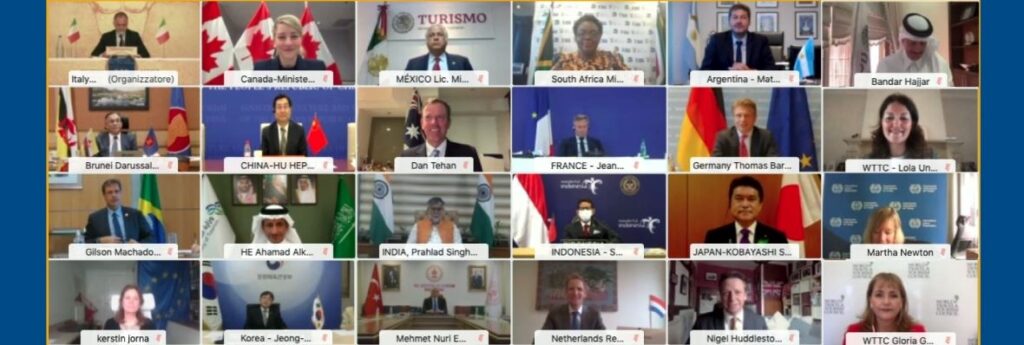Government ministers attending a virtual G20 nations meeting in Rome this week agreed that “more needs to be done” to address the crisis in tourism caused by the COVID-19 pandemic. What that is remains to be seen, though recognition of a universal standard for vaccinated passengers is one measure gaining ground.
Canada’s representative at the official G20 Tourism Ministers Meeting, Mélanie Joly, said international collaboration is necessary “to bring prosperity back to the tourism sector” – a notion agreed by ministers of the group, who said the impacts of the pandemic must be addressed in a co-ordinated way, not least to encourage public confidence through the recovery of sector, which Joly acknowledged has been one of the hardest hit by the pandemic.
Broadly speaking, the ministers endorsed the “G20 Rome Guidelines for the Future of Tourism,” which includes seven principles: Safe mobility; Crisis management; Resilience; Inclusiveness; Green transformation; Digital transition; and Investment and infrastructure.
In a communiqué from the meeting, the ministers said: “We emphasize that the resumption of travel and tourism is crucial for global economic recovery because of the direct and indirect economic impact this sector has on others. Travel and tourism are key drivers for sustainable and balanced growth and development, and they represent a valuable contribution to the G20 agenda.”
The sentiment was shared at a concurrent G7 transport ministers meeting in London, with members, including Canada, going a step further by suggesting the resumption of international travel once the pandemic recedes will require a co-ordinated approach to COVID-19 testing and recognizing whether passengers have been vaccinated.
“We have committed to working on a common set of principles to guide the resumption of international travel when it’s safe to do so,” Transport Minister Omar Alghabra said in a statement following his virtual participation in the meeting.
“At the centre of this effort must be a co-ordinated approach for testing and a common platform for recognizing the vaccinated status of travellers,” he said. “As we work to build back better, the establishment of a system that will protect our privacy and personal information, and that will be accessible, fair, and equitable is imperative. We must apply lessons learned from innovative technologies to identify long-term, sustainable solutions and expand upon them globally.”
Alghabra said the transport ministers of G7 countries have a leading role to play in advancing a new global framework for international travel that will be key to safely resuming the free movement of both people and goods around the world.
Along with Canada, the G7 includes the UK, US, France, Germany, Italy, and Japan, along with the European Union.
Immigration Minister Marco Mendicino said his department is involved in discussions with the World Health Organization and the International Civil Aviation Organization around setting a universal standard to promote the safe travel of those who have been vaccinated.
Mendicino said the government is working to put in place a system to recognize people who have been vaccinated.
“We’re continuing to work towards a world in which there will be a system in place to recognize passports,” he said. “We are certainly advancing that work both domestically as well as abroad.”
As we reported earlier this week, Prime Minister Justin Trudeau confirmed Tuesday that Canada may require international travellers to prove they were vaccinated against COVID-19 before they can enter the country.
Trudeau said the federal government hopes to align its policy on the issue with its international allies, but he also said Canada might require American visitors to prove they were vaccinated against COVID-19 before entering the country regardless of whether the United States will require Canadians to do so or not.
“Our responsibility is to do everything necessary to protect Canadians, and we are going to do that, even if there isn’t automatically symmetry with other countries,” Trudeau said.
At the tourism minister’s meeting in Italy, the group took time to applaud their own governments’ “impressive action to date to address the impacts of the crisis on the tourism sector, support tourism businesses and destinations, minimize job losses, and support the recovery in 2021 and beyond.”
The Canadian government pointed out that it has taken “great strides to help this country’s sector,” including having already provided an estimated $15.4 billion in support to tourism, arts, and culture through federal emergency support programs, and allocating $1 billion dollars in aid in the recent budget, including a $500-million Tourism Relief Fund to support the recovery of tourism businesses from the pandemic.
However, several tourism organizations, including ACTA and ITAC, have echoed the G20 tourism ministers, stating that domestically more needs to be done.
The Tourism Industry Association of Canada (TIAC) welcomed initiatives in the recent budget, but carefully stated: “Our first step will be to continue advocating for those pieces that were not addressed in the budget, and to ensure effective deployment of the promised support and relief programs. In addition, we will investigate all non-sector specific funding programs mentioned throughout the budget to see how they can support our industry.”
Joly, meanwhile, stated that her ministry (Economic Development and Official Languages, including tourism), is committed to “supporting a strong economic recovery through existing federal emergency support programs and through new investments that will draw visitors to towns and cities across the country, unleashing spending that stimulates local economies”; and secondly, “to work with countries around the world to bring prosperity back to the tourism sector.”
“The fact that the G20 has identified tourism as a priority area for discussion,” she said, “is a testament to the sector’s important contributions to the global economy and its role as an engine for job creation and future economic growth.”

